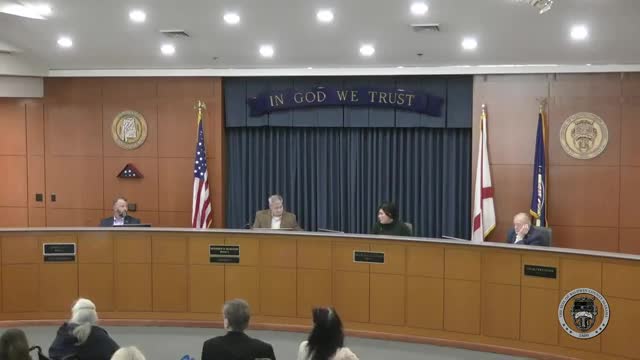Baldwin County adopts updated subdivision regulations after public hearing; planners say changes clarify standards
Get AI-powered insights, summaries, and transcripts
Subscribe
Summary
The Baldwin County Commission voted unanimously Jan. 7 to adopt amendments to the county's subdivision regulations after a public hearing and staff briefings, officials said the changes clarify review time frames, stormwater and utility requirements.
The Baldwin County Commission voted unanimously Jan. 7 to adopt a comprehensive set of amendments to the Baldwin County Subdivision Regulations, after a public hearing and staff presentations that planners said clarify requirements for utility coordination, stormwater, open space and review time frames.
The vote and scope: At the Jan. 7 meeting, a commissioner moved "I make a motion we adopt the amendments to the Baldwin County subdivision regulations as presented today." A second was recorded and the commission answered "Aye"; the clerk and staff confirmed the adoption was unanimous. Planning staff told the commission that, if the board adopted the changes at the meeting, the amendments would become effective immediately.
Why it matters: Planning staff said the rewrite brings county technical standards closer to municipal practice and aims to reduce inconsistent interpretation of the rules. The changes include clarified review time frames for staff, a revised method for calculating required open space (tied to lot size and density), removal of a new street-tree mandate, clarified wetland and Corps-of-Engineers coordination language, and updated low-impact development (LID) stormwater standards.
Public comment and major themes: Dozens of residents, industry representatives and advocates spoke during the hearing. Luke Kisla, government affairs director for Mobile Baykeeper, urged adoption, saying the revisions "will help protect wetlands from destruction, address storm water runoff to natural water bodies and neighboring properties, and help prevent the many complications that can arise from inadequate utility service." Several developers and contractors urged clearer wording and requested economic-impact analysis for some provisions; one speaker asked the county to consult local university experts on costs before final implementation. Planning staff told the meeting they had prepared a checklist and were available to clarify submission requirements such as preliminary utility plans at the preliminary-plat stage.
How the regulations change practice: Among the detailed edits planners highlighted: - Review time frames: Established processing windows and a checklist to improve consistency across reviewers. - Family-exemption clarification: Grandparents and grandchildren are explicitly included as "immediate family" eligible for an exemption. - Open space: Calculation method tied to lot size and density instead of a fixed formula. - Utilities and sewer extensions: Preliminary plats must include an engineered utility plan that shows how a development will be served; staff said the intent is a utility-engineer-level plan and utility-provider agreement to enable conditioning approvals, not full construction drawings. - LID/stormwater: Developers can qualify for smaller lot-size options if they demonstrate specified runoff, suspended solids and nutrient reductions.
Adoption and next steps: A commissioner moved for adoption at 1:53 p.m. (during the meeting); staff confirmed the motion and second and recorded unanimous approval. Planning staff said they would circulate the updated checklist and begin implementing the clarified review steps; they also told applicants and the public that state law governs notification and some procedural requirements.
Ending: Commissioners and staff said they will monitor implementation and continue outreach to municipalities and applicants as the rules take effect.
